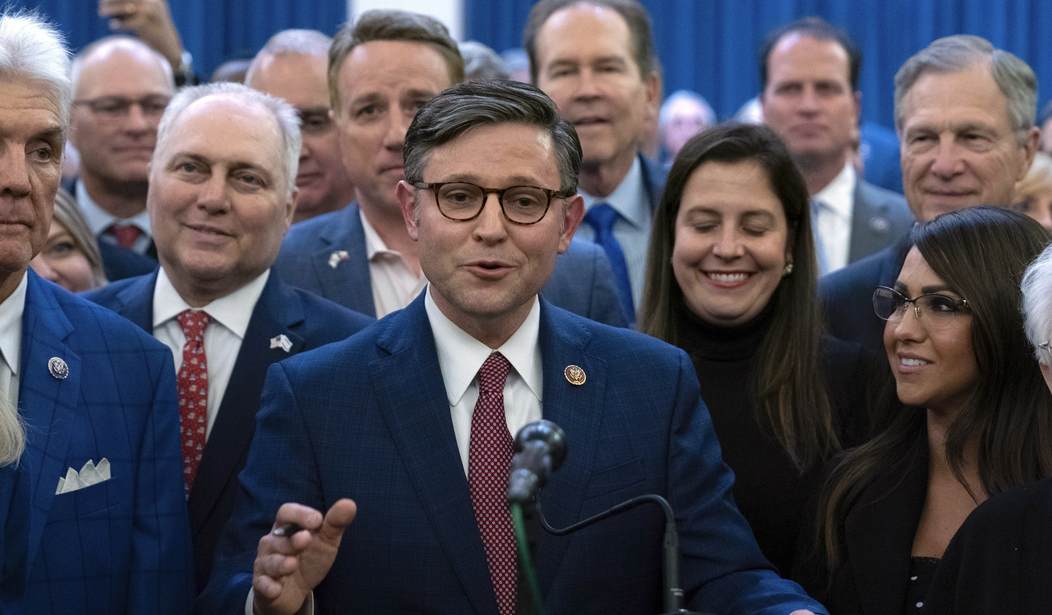In fewer than two weeks on the job, new House Speaker Mike Johnson has already changed the way Washington does business when it comes to funding government programs. That’s no small feat, and if Senate Republicans follow suit and back him up, it could herald the dawn of a new era for fiscal responsibility.
Johnson knows he was chosen by his fellow Republicans to replace the departed Kevin McCarthy because McCarthy did not live up to the promises he made back in January (when he was seeking to lock down the votes necessary to win election as Speaker) to rein in out-of-control government spending. Specifically, even after making those promises, it was McCarthy’s choice, in a desperate move to avoid a temporary, partial government shutdown, to put on the House floor a so-called “clean” Continuing Resolution that maintained government spending at its current (read: Democrat-set) spending levels that sparked the outrage that led to the rebellion that deposed McCarthy as Speaker.
Clearly, Johnson paid attention. Determined to avoid the same fate, Johnson applied the lessons he learned to his first big spending battle – President Biden’s request for $106 billion in emergency supplemental spending for Ukraine, Israel, Taiwan, and the southern border.
Johnson’s first decision was to split the bill. Our ally Israel, the victim of a sneak attack on the order of the 9/11 attacks, needs immediate assistance to fight back against the Iran-backed Islamic terror organizations that have targeted Israel and its citizens for destruction. Rather than take a chance on slowing down the provision of emergency assistance to Israel by tying its funding to a funding request for Ukraine – funding which simply does not enjoy the same level of support that funding for Israel does – Johnson chose to separate the two, and instead introduced a spending bill that appropriates funding only for Israel.
Recommended
It was Johnson’s next decision that upset the Washington Swamp, however – Johnson insisted that the $14.5 billion appropriated for Israel in his new spending bill be offset by a similarly-sized rescission of funds already appropriated for some other purpose. In insisting on an equal and opposite offset, Johnson returned to government spending a long-lost and fundamental principle – that to govern is to choose.
Budgeting appropriately – that is, matching outflows to inflows, to maintain fiscal discipline and avoid deficit spending – requires hard choices. We simply cannot have everything we want. Yet political creatures (read: members of Congress) prefer to avoid hard choices. Left to their own devices, they would never make a hard choice at all. Why would they deny themselves the pleasure they get from doling out Other People’s Money if they didn’t have to?
For the last two decades, at least, Washington has operated under the assumption that hard choices could be avoided. That’s how we ended up with a $33 trillion national debt, projected to rise to $50 trillion within ten years.
Speaker Johnson appears to be the first senior-level government leader in quite some time who truly understands the danger posed by our massive and growing national debt. Moreover, he appears to be the first senior-level government leader in quite some time determined to actually change direction – not just take his foot off the gas (which leaves us headed in the same direction, a bit slower) but to actually turn the steering wheel in a different direction and get us off our current unsustainable path.
In the case of this particular spending bill, Speaker Johnson proposes to pay for the emergency spending on Israel’s behalf by rescinding $14.5 billion from the huge pot of money ($80 billion) that was appropriated last year for the Internal Revenue Service to expand by hiring another 87,000 employees.
If ever there were a federal government agency that does not need, nor deserve, an appropriation of $80 billion to hire 87,000 new employees, it is the IRS. The IRS has both the lowest favorability rating and the highest unfavorability rating of any federal government agency tested by the Pew Research Center. That’s not surprising – based on scandals going back over many years (including the Tea Party targeting scandal, in which no one was ever held accountable for the IRS’s years-long actions to violate American citizens’ constitutionally-protected rights, and the more recent leaks of private taxpayer data), the IRS’s image is down in the gutter, and deservedly so.
Speaker Johnson forced a choice on the people’s elected representatives – we could provide much-needed assistance to our ally in need, but only if we paid for it by diverting monies already appropriated and set aside to allow the IRS to grow its work force. Each Representative was given the opportunity to choose: Stand with Israel, or stand with the IRS.
Many Democrats screamed bloody murder. The thought of having to make a hard choice is anathema to them – in their world, hard choices are avoided on a regular basis by simply spending on the desired program and then, if there’s not enough money in the till to pay the bill, just forwarding the unpaid invoice to future generations (read: our children and grandchildren) in the form of deficit spending that eventually gets tacked on to the national debt.
In the event, a dozen House Democrats stood with Israel and voted with all but two House Republicans to take money meant for the IRS and repurpose it to help Israel. The spending bill passed the House and is awaiting action by the Senate.
Speaker Johnson has shown Washington that political creatures can make hard choices. He has demonstrated that we don’t have to mortgage our children’s and grandchildren’s futures to pay for things we want and need now. We just need to be as determined as Speaker Johnson is to change things, to get us off this unsustainable path and back on course toward fiscal discipline.
Jenny Beth Martin is Honorary Chairman of Tea Party Patriots Action.

























Join the conversation as a VIP Member